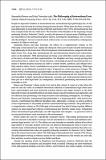|
Reseña:
|
Despite its important tradition in international law, international legal philosophy has, for the most part, been left aside by scholars during the past decades. While there has been a revival in legal philosophy in most fields starting with Hart and Rawls in the 1960s, international law has been conspicuously left out of this move. The founders of the discipline at the beginning of legal modernity (Grotius, Pufendorf, Vattel), as well as the pioneers of current ways of thinking about law and politics in the international sphere (Kelsen, Lauterpacht, Morgenthau), are, of course, all acknowledged but not so much reread, rediscovered, or even overturned by contemporary research. Is it time to catch up? Samantha Besson and John Tasioulas, the editors of a comprehensive volume on The Philosophy of International Law, explain the disregard of the past decades towards international legal philosophy by the lower state of the development of international law compared with other fields of law. For a long time, international law and international lawyers have found themselves on the defensive. With international law being a law with little coercive means, always at the mercy of states and their representatives, the discipline was busy enough proving that international law is, indeed, law. In this situation, scholarship presented international law as a means to further progress and peace in order to counter doubts, questions, and critique forcefully raised by others. Such a constellation is not prone to fundamental questioning. While legal philosophy can be affirmative towards its object, it depends on a basic openness to critique. The recent revival of international legal philosophy can thus be interpreted as a sign of the development and the increasing maturity of international law: international law has widened in scope and intensified in depth; international financial, economic and environmental relations have been put on. |

